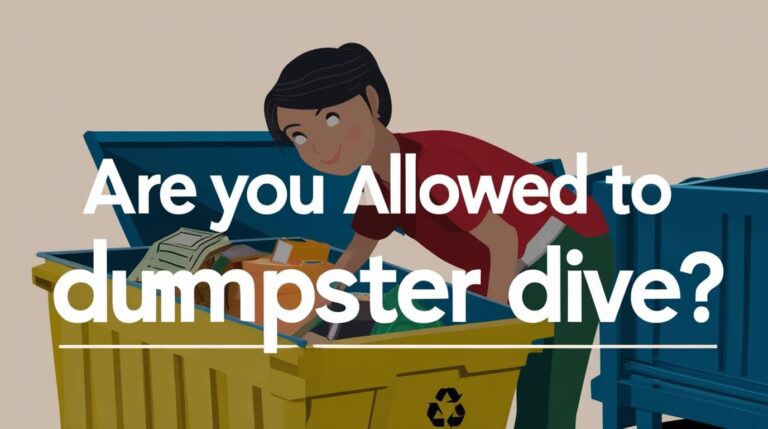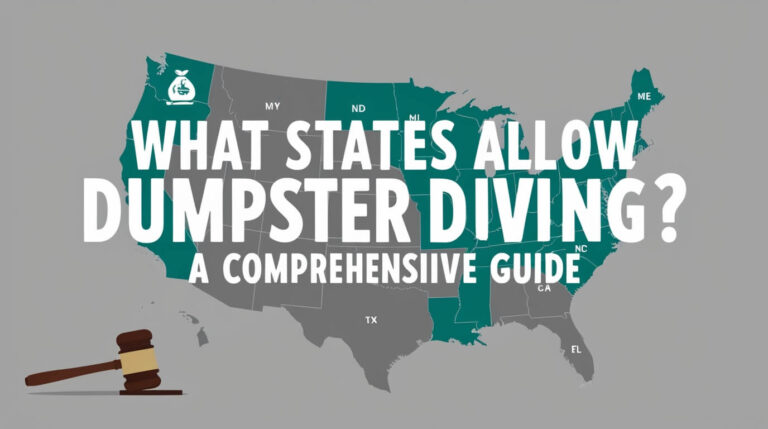
In a world where waste seems to be an unavoidable byproduct of our consumerist society, the concept of dumpster diving has emerged as a creative and sustainable solution. For the uninitiated, dumpster diving involves rummaging through trash containers in search of valuable or usable items that have been discarded. While this practice may raise eyebrows, it has gained a dedicated following among those seeking to reduce waste, save money, and find unique treasures.
However, not all dumpsters are created equal. Some locations offer better opportunities for treasure hunting than others. Where are the best places to dumpster dive? The top spots for dumpster diving include retail stores, grocery stores, residential areas, construction sites, and college campuses, among others. In this comprehensive guide, we’ll explore these prime locations and provide valuable tips to help you maximize your chances of finding hidden gems while dumpster diving responsibly.
What is Dumpster Diving?
Dumpster diving, also known as bin diving or dumpster diving, is the practice of sifting through commercial or residential trash receptacles to find valuable or reusable items that have been discarded. While the concept may seem unconventional, it has gained popularity among individuals seeking to reduce waste, save money, and find unique items that would otherwise end up in landfills.
There are several reasons why people engage in dumpster diving:
- Saving Money: For those on a tight budget, dumpster diving can be a way to acquire items for free or at a significantly reduced cost, from furniture and electronics to clothing and books.
- Reducing Waste: With the growing awareness of the environmental impact of waste, dumpster diving has become a means of diverting usable items from landfills, contributing to a more sustainable lifestyle.
- Finding Unique Items: Dumpster diving can be a treasure hunt, where unique and interesting items can be discovered, such as antiques, collectibles, or rare finds that may have been discarded by mistake.
Dumpster diving may be legal, but check local laws and respect private property to avoid legal issues.
Is Dumpster Diving Legal?
The legality of dumpster diving is a complex issue that varies depending on location and specific circumstances. In 1988, the Supreme Court ruling in the case of “California vs. Greenwood” made dumpster diving technically legal in most states. The ruling established that once an item is discarded and placed in a public space, it is considered abandoned property, and individuals have the right to take possession of it.
However, this ruling does not provide a blanket legalization of dumpster diving. Local laws and ordinances may still prohibit or regulate the practice. For example, some municipalities have specific laws against “scavenging” or “rummaging through trash,” which could potentially criminalize dumpster diving.
Trespassing laws apply if you enter private property without permission, even if the dumpster is accessible from a public area.
To avoid legal complications, it’s crucial to research and understand the local laws and regulations surrounding dumpster diving in your area. It’s also advisable to respect private property boundaries and obtain permission from property owners or managers before engaging in dumpster diving on their premises.
Potential Risks and Safety Precautions
While dumpster diving can be a rewarding experience, it’s essential to be aware of the potential risks and take necessary safety precautions. Here are some hazards to be mindful of:
- Sharp Objects: Dumpsters may contain broken glass, sharp metal edges, or other hazardous objects that can cause cuts or injuries.
- Hazardous Materials: Certain dumpsters, particularly those from industrial or medical facilities, may contain hazardous materials, chemicals, or biohazards that pose serious health risks.
- Pests and Vermin: Trash receptacles can attract rodents, insects, and other pests that may carry diseases or pose a risk of bites or stings.
To mitigate these risks, it’s essential to take the following safety precautions:
- Wear Protective Gear: Invest in sturdy gloves, closed-toe shoes or boots with good traction, and long sleeves to protect against cuts, scratches, and potential hazards.
- Use Proper Tools: Bring a flashlight or headlamp to illuminate the dumpster and a grabbing tool or stick to retrieve items without reaching too far into the container.
- Avoid Night Diving: While the cover of darkness may seem appealing, dumpster diving at night increases the risk of injury and potential encounters with unsavory individuals.
- Never Dive into Compactors: Compactors are extremely dangerous and should be avoided at all costs.
- Respect Private Property: Never trespass on private property or access dumpsters located on private premises without explicit permission.
- Stay Alert: Be aware of your surroundings and potential hazards, such as nearby traffic or unstable ground conditions.
By following these safety guidelines, you can minimize the risks associated with dumpster diving and enjoy a more secure and rewarding experience.
The Best Places to Dumpster Dive
Now that we’ve covered the basics of dumpster diving, it’s time to explore the prime locations where treasure hunters can strike gold. While the potential finds may vary, these spots offer promising opportunities for discovering valuable or usable items.
Retail Stores and Shopping Malls
Retail stores and shopping malls are prime dumpster diving destinations due to the sheer volume of merchandise they handle daily. These locations often discard a wide range of items, from clothing and accessories to electronics and furniture.
- Big-Box Stores: Stores like Walmart, Target, and Best Buy are known for discarding returns, damaged items, and overstock merchandise. These dumpsters can yield everything from electronics and appliances to clothing, toys, and home goods.
- Strip Malls: Strip malls offer a diverse array of dumpsters from various retailers, increasing the chances of finding a wide range of items.
- Shopping Malls: Large shopping malls typically have designated dumpster areas near the back of the property. These dumpsters can be a goldmine for treasures from various stores within the mall. However, it’s advisable to check these areas after the mall has closed to avoid potential conflicts with security.
- Specialty Stores: Certain specialty stores, such as GameStop (for video games and accessories), Ulta (for beauty products), and Bath & Body Works (for personal care items), are known for discarding merchandise that may still be usable or valuable.
When dumpster diving at retail locations, it’s essential to exercise caution and respect. Avoid trespassing on private property, and consider asking store managers or employees about their disposal schedules to increase your chances of finding valuable items.
Grocery Stores and Bakeries
Grocery stores and bakeries are prime spots for dumpster divers seeking discarded food items or baked goods. While it’s crucial to exercise caution when handling perishable items, these locations can yield a bounty of edible treasures.
- Grocery Stores: Grocery stores often discard produce, bread, and other food items nearing their expiration dates or with minor blemishes. While it’s advisable to avoid taking meat or dairy products that require refrigeration, many other discarded items may still be perfectly edible.
- Bakeries: Bakeries are known for discarding day-old baked goods, such as bread, pastries, and donuts. These items are often discarded in sealed bags, making them easier to identify and retrieve.
When dumpster diving for food items, it’s essential to exercise caution and good judgment. Avoid taking any items that show signs of spoilage or contamination, and consider asking employees about their disposal schedules to increase your chances of finding fresh items.
Residential Areas
Residential areas can be treasure troves for dumpster divers, offering a wide range of discarded household items, from furniture and appliances to clothing and toys.
- Affluent Neighborhoods: Affluent neighborhoods are often prime targets for dumpster divers, as residents may discard perfectly usable items simply because they no longer need or want them.
- Apartment Complexes and Condos: Apartment complexes and condos can yield a wealth of discarded items, particularly during move-out periods when tenants are purging their belongings.
- Curbside Bins: Even in regular neighborhoods, curbside trash bins can be a goldmine for dumpster divers. Residents often discard furniture, toys, tools, and other household items that may still be in good condition or easily repairable. The best time to check these bins is typically on designated trash collection days when residents are more likely to discard larger items.
- Garage Sales and Moving Sales: Keep an eye out for garage sales or moving sales in your area. Homeowners often discard items that didn’t sell or were deemed too much effort to move. These discards can be a dumpster diver’s treasure trove.
Dumpster dive in public areas and curbside bins, respecting private property and avoiding trespassing.
Construction and Remodeling Sites
Construction and remodeling sites can be goldmines for dumpster divers seeking building materials, fixtures, or even appliances and furniture.
- New Construction Sites: New construction sites often discard excess building materials, such as wood, metal, or even fixtures and appliances that may have been replaced or damaged during the construction process.
- Remodeling Projects: Homeowners or businesses undergoing renovations frequently discard old cabinets, appliances, fixtures, and other items that have been replaced during the remodeling process.
Be careful when searching for valuables at construction sites. They can be dangerous due to unstable ground and heavy machinery. Prioritize safety and avoid trespassing on active work sites.
Other Notable Spots
While the locations mentioned above are among the most popular and promising for dumpster diving, there are several other spots worth exploring:
- College and University Campuses: Dumpsters on college campuses can be goldmines during move-out periods when students are vacating their dorms or apartments. You may find discarded furniture, electronics, books, and other items.
- Electronics Repair Shops: Electronics repair shops often discard cables, cords, and even functional electronics that have been returned or deemed too costly to repair.
- Florists: Florists may discard slightly wilted flowers, vases, or pots that are still in decent condition and suitable for repurposing or gifting.
- Salvage Shops and Scrap Yards: While not technically dumpster diving, salvage shops, and scrap yards can be excellent sources for discarded metals, appliances, furniture, and other items that can be repurposed or resold.
Tips for Successful Dumpster Diving
To maximize your chances of finding valuable or usable items while dumpster diving, consider the following tips:
- Scout Locations: Before diving into a dumpster, scout the area and observe the types of items being discarded. This can help you identify the most promising locations and save time and effort.
- Check Schedules: Many businesses and residential areas have designated trash collection days or times. Knowing these schedules can help you time your dumpster diving excursions for maximum efficiency.
- Bring Proper Equipment: In addition to protective gear, bring bags, boxes, or a cart to transport your finds easily. A grabbing tool or stick can also be helpful for retrieving items without reaching too far into the dumpster.
- Be Discreet: While dumpster diving is legal in many areas, it can still raise eyebrows or concerns among bystanders. Maintain a low profile and be respectful of the surroundings to avoid any unnecessary confrontations.
- Leave No Trace: After rummaging through a dumpster, be sure to clean up any mess you may have made and leave the area as you found it. This helps maintain a positive reputation for dumpster divers and ensures continued access to these locations.
- Consider Joining a “Trash Tour”: In some cities, experienced dumpster divers offer guided “trash tours” that can provide valuable insights and introduce you to the best dumpster diving spots in your area.
Frequently Asked Questions
What are the most common items found while dumpster diving?
The most common items found while dumpster diving include furniture, electronics, books, clothing, toys, tools, and building materials. However, the specific inventory can vary greatly depending on the location and the types of businesses or residences in the area.
What is the best time to go dumpster diving?
The best time to go dumpster diving varies depending on the location:
- For residential areas, early morning hours on designated trash collection days are ideal, typically before 7 AM.
- For businesses and retail stores, the best times are often after closing hours or late at night. It’s generally advisable to check specific locations multiple times to increase your chances of finding valuable items.
Do I need any special equipment for dumpster diving?
While not strictly required, having the proper equipment can make dumpster diving safer and more efficient:
- Protective gear: Sturdy gloves, closed-toe shoes or boots, and long sleeves.
- Tools: Flashlight or headlamp, grabbing tool or stick, bags or boxes for transporting finds.
- It’s essential to avoid diving into compactors or climbing into dumpsters, as these actions can be extremely dangerous.
What should I do if I get caught dumpster diving?
If caught dumpster diving, remain polite and explain your intentions calmly. In most cases, the worst outcome is a warning or citation, especially if you’re on public property. However, trespassing on private property can potentially lead to more serious consequences, such as a trespassing charge. Always respect private property boundaries and obtain permission if necessary.
Conclusion
Dumpster diving can be a rewarding and sustainable practice, allowing you to find valuable or usable items that would otherwise end up in landfills. By exploring the prime locations outlined in this guide and following essential safety precautions, you can embark on a treasure hunt that not only satisfies your curiosity but also contributes to reducing waste.
Remember to prioritize your safety, respect private property boundaries, and check local regulations before diving into any dumpster. With the right approach and mindset, dumpster diving can become an exciting and fulfilling adventure, one discarded treasure at a time.






